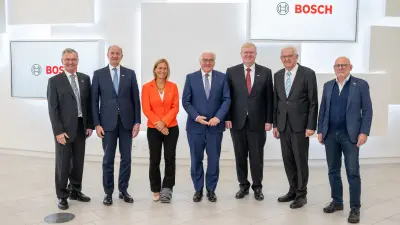German Federal President Frank-Walter Steinmeier visits Bosch Research
As part of his event series “Workshop of Change,” German Federal President Frank-Walter Steinmeier visited the Bosch Research Campus in Renningen, Germany. During his visit, he learned about the use of AI in development, manufacturing and products at Bosch.

In order to exploit the full potential of artificial intelligence (AI), Bosch Research and the Bosch Center for Artificial Intelligence (BCAI) have been conducting research into the application of AI since 2017. The research serves to develop future-proof products and services that are more efficient, safer and more user-friendly. Various AI methods, such as deep learning, natural language processing and reinforcement learning, as well as the latest techniques such as generative AI and foundation models, in particular large language models, are used.
On November 15, 2024, Federal President Frank-Walter Steinmeier visited the Bosch Research headquarters to see Bosch's AI solutions firsthand. The Minister President of Baden-Württemberg, Winfried Kretschmann, was on site, as was Baden-Württemberg's Minister of Transport, Winfried Hermann. The visit took place as part of the “Workshop of Change” series of events, through which the Federal President intends to contribute to showcasing places of successful transformation.
“The innovations of tomorrow are being created at the research campus in Renningen. Bosch has been bringing AI solutions from its own research into application for a long time,” said Bosch CEO Stefan Hartung, who gave the guests a tour of the site together with Tanja Rückert, Member of the Board of Management of Bosch responsible for Digital, and Thomas Kropf, President of Bosch Research. “Artificial intelligence is a key technology and an innovation booster for Bosch. We want to generate new growth with artificial intelligence and continue to grow with AI-enabled products in the coming years. Every Bosch product already contains AI or has been created with its help,” Hartung continued.
German President Frank-Walter Steinmeier had the chance to see some of Bosch's innovative AI solutions for himself in Renningen, Germany. Associates presented him with their solutions for development, manufacturing and in products.
AI solutions from Bosch
At Bosch, AI is used in research and product development, for example in the area of electric motor development. The conventional optimization of electric motors using traditional simulations is costly and time-consuming. Bosch Research is developing an optimization tool that enables the simultaneous analysis, evaluation and improvement of electric motor designs. This speeds up the development process and identifies more efficient and powerful designs that might have remained uncovered using conventional methods.
One example of the use of AI in industrialization is the automated optical inspection of components in production. AI-supported systems detect defective parts faster and more reliably, significantly reducing rejects and reworking costs. In addition, generative AI can generate synthetic data which reduces the introduction and establishment of these systems for visual inspection from several months to a few weeks.
AI is also being used at Bosch to further enhance environmental perception in automated and assisted driving. Various sensor types such as video cameras and radar signals are used for this purpose, which have specific strengths and weaknesses in environmental conditions such as darkness or rain. Sensor data fusion is used to combine the various sensor technologies. Bosch Research is conducting research for an AI model based on this, which automatically recognizes when it would be more advisable to use radar sensors instead of cameras, for example.
The wall scanner of Bosch's Power Tools division also uses sensor technologies to detect electrical cables or cavities in walls, for example. By applying improved AI algorithms and neural networks, such objects are to be detected, localized and classified even more accurately in the future. Bosch is also researching the use of AI in thermal imaging cameras in the future. This will improve the resolution and quality of thermal images.
Generative AI as a booster for innovation
“It is abundantly clear that artificial intelligence will bring changes to our lives. Also for companies, as well as for the economy,” summarized Federal President Steinmeier. “I am delighted that we have been able to see here at the Bosch site in Renningen how artificial intelligence is already being used throughout the entire value chain. For services as well as products.” President of Bosch Research Thomas Kropf concluded: “Generative AI marks a new industrial revolution that is profoundly changing society, industry and the economy. Bosch is one of the leading companies in the use and development of AI by combining our expertise in manufacturing, mobility and buildings with state-of-the-art AI technology.”